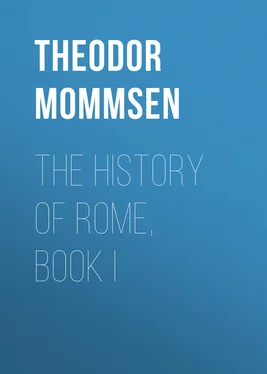Theodor Mommsen - The History of Rome, Book I
Здесь есть возможность читать онлайн «Theodor Mommsen - The History of Rome, Book I» — ознакомительный отрывок электронной книги совершенно бесплатно, а после прочтения отрывка купить полную версию. В некоторых случаях можно слушать аудио, скачать через торрент в формате fb2 и присутствует краткое содержание. Жанр: foreign_prose, История, foreign_edu, foreign_antique, на английском языке. Описание произведения, (предисловие) а так же отзывы посетителей доступны на портале библиотеки ЛибКат.
- Название:The History of Rome, Book I
- Автор:
- Жанр:
- Год:неизвестен
- ISBN:нет данных
- Рейтинг книги:5 / 5. Голосов: 1
-
Избранное:Добавить в избранное
- Отзывы:
-
Ваша оценка:
- 100
- 1
- 2
- 3
- 4
- 5
The History of Rome, Book I: краткое содержание, описание и аннотация
Предлагаем к чтению аннотацию, описание, краткое содержание или предисловие (зависит от того, что написал сам автор книги «The History of Rome, Book I»). Если вы не нашли необходимую информацию о книге — напишите в комментариях, мы постараемся отыскать её.
The History of Rome, Book I — читать онлайн ознакомительный отрывок
Ниже представлен текст книги, разбитый по страницам. Система сохранения места последней прочитанной страницы, позволяет с удобством читать онлайн бесплатно книгу «The History of Rome, Book I», без необходимости каждый раз заново искать на чём Вы остановились. Поставьте закладку, и сможете в любой момент перейти на страницу, на которой закончили чтение.
Интервал:
Закладка:
Graeco-Italian Culture
The task, however, of determining the degree of culture which the Indo-Germans had attained before the separation of the stocks properly belongs to the general history of the ancient world. It is on the other hand the special task of Italian history to ascertain, so far as it is possible, what was the state of the Graeco-Italian nation when the Hellenes and the Italians parted. Nor is this a superfluous labour; we reach by means of it the stage at which Italian civilization commenced, the starting-point of the national history.
Agriculture
While it is probable that the Indo-Germans led a pastoral life and were acquainted with the cereals, if at all, only in their wild state, all indications point to the conclusion that the Graeco-Italians were a grain-cultivating, perhaps even a vine-cultivating, people. The evidence of this is not simply the knowledge of agriculture itself common to both, for this does not upon the whole warrant the inference of community of origin in the peoples who may exhibit it. An historical connection between the Indo-Germanic agriculture and that of the Chinese, Aramaean, and Egyptian stocks can hardly be disputed; and yet these stocks are either alien to the Indo-Germans, or at any rate became separated from them at a time when agriculture was certainly still unknown. The truth is, that the more advanced races in ancient times were, as at the present day, constantly exchanging the implements and the plants employed in cultivation; and when the annals of China refer the origin of Chinese agriculture to the introduction of five species of grain that took place under a particular king in a particular year, the story undoubtedly depicts correctly, at least in a general way, the relations subsisting in the earliest epochs of civilization. A common knowledge of agriculture, like a common knowledge of the alphabet, of war chariots, of purple, and other implements and ornaments, far more frequently warrants the inference of an ancient intercourse between nations than of their original unity. But as regards the Greeks and Italians, whose mutual relations are comparatively well known, the hypothesis that agriculture as well as writing and coinage first came to Italy by means of the Hellenes may be characterized as wholly inadmissible. On the other hand, the existence of a most intimate connection between the agriculture of the one country and that of the other is attested by their possessing in common all the oldest expressions relating to it; -ager-, —agros—; -aro aratrum-, —aroo arotron—; -ligo-alongside of —lachaino—; -hortus-, —chortos—; -hordeum-, —krithei—; -milium-, —melinei—; -rapa-, —raphanis-; -malva-, —malachei—; -vinum-, —oinos—. It is likewise attested by the agreement of Greek and Italian agriculture in the form of the plough, which appears of the same shape on the old Attic and the old Roman monuments; in the choice of the most ancient kinds of grain, millet, barley, spelt; in the custom of cutting the ears with the sickle and having them trodden out by cattle on the smooth-beaten threshing-floor; lastly, in the mode of preparing the grain -puls- —poltos—, -pinso- —ptisso—, -mola- —mulei—; for baking was of more recent origin, and on that account dough or pap was always used in the Roman ritual instead of bread. That the culture of the vine too in Italy was anterior to the earliest Greek immigration, is shown by the appellation "wine-land" (—Oinotria—), which appears to reach back to the oldest visits of Greek voyagers. It would thus appear that the transition from pastoral life to agriculture, or, to speak more correctly, the combination of agriculture with the earlier pastoral economy, must have taken place after the Indians had departed from the common cradle of the nations, but before the Hellenes and Italians dissolved their ancient communion. Moreover, at the time when agriculture originated, the Hellenes and Italians appear to have been united as one national whole not merely with each other, but with other members of the great family; at least, it is a fact, that the most important of those terms of cultivation, while they are foreign to the Asiatic members of the Indo-Germanic family, are used by the Romans and Greeks in common with the Celtic as well as the Germanic, Slavonic, and Lithuanian stocks. 9 9 Thus -aro-, -aratrum- reappear in the old German -aran- (to plough, dialectically -eren-), -erida-, in Slavonian -orati-, -oradlo-, in Lithuanian -arti-, -arimnas-, in Celtic -ar-, -aradar-. Thus alongside of -ligo- stands our rake (German -rechen-), of -hortus- our garden (German -garten-), of -mola- our mill (German -muhle-, Slavonic -mlyn-, Lithuanian -malunas-, Celtic -malin-). With all these facts before us, we cannot allow that there ever was a time when the Greeks in all Hellenic cantons subsisted by purely pastoral husbandry. If it was the possession of cattle, and not of land, which in Greece as in Italy formed the basis and the standard of all private property, the reason of this was not that agriculture was of later introduction, but that it was at first conducted on the system of joint possession. Of course a purely agricultural economy cannot have existed anywhere before the separation of the stocks; on the contrary, pastoral husbandry was (more or less according to locality) combined with it to an extent relatively greater than was the case in later times.
The distinction between the common inheritance of the nations and their own subsequent acquisitions in manners and in language is still far from having been wrought out in all the variety of its details and gradations. The investigation of languages with this view has scarcely begun, and history still in the main derives its representation of primitive times, not from the rich mine of language, but from what must be called for the most part the rubbish-heap of tradition. For the present, therefore, it must suffice to indicate the differences between the culture of the Indo-Germanic family in its oldest undivided form, and the culture of that epoch when the Graeco-Italians still lived together. The task of discriminating the results of culture which are common to the European members of this family, but foreign to its Asiatic members, from those which the several European groups, such as the Graeco-Italian and the Germano-Slavonic, have wrought out for themselves, can only be accomplished, if at all, after greater progress has been made in linguistic and historical inquiries. But there can be no doubt that, with the Graeco-Italians as with all other nations, agriculture became and in the mind of the people remained the germ and core of their national and of their private life. The house and the fixed hearth, which the husbandman constructs instead of the light hut and shifting fireplace of the shepherd, are represented in the spiritual domain and idealized in the goddess Vesta or —Estia— almost the only divinity not Indo-Germanic yet from the first common to both nations. One of the oldest legends of the Italian stock ascribes to king Italus, or, as the Italians must have pronounced the word, Vitalus or Vitulus, the introduction of the change from a pastoral to an agricultural life, and shrewdly connects with it the original Italian legislation. We have simply another version of the same belief in the legend of the Samnite stock which makes the ox the leader of their primitive colonies, and in the oldest Latin national names which designate the people as reapers (-Siculi-, perhaps also -Sicani-), or as field-labourers (-Opsci-). It is one of the characteristic incongruities which attach to the so-called legend of the origin of Rome, that it represents a pastoral and hunting people as founding a city. Legend and faith, laws and manners, among the Italians as among the Hellenes are throughout associated with agriculture. 10 10 Nothing is more significant in this respect than the close connection of agriculture with marriage and the foundation of cities during the earliest epoch of culture. Thus the gods in Italy immediately concerned with marriage are Ceres and (or?) Tellus (Plutarch, Romul. 22; Servius on Aen. iv. 166; Rossbach, Rom. Ehe, 257, 301), in Greece Demeter (Plutarch, Conjug. Praec. init.); in old Greek formulas the procreation of children is called —arotos—(ii. The Family and the State, note); indeed the oldest Roman formof marriage, -confarreatio-, derives its name and its ceremony from the cultivation of corn. The use of the plough in the founding of cities is well known.
Интервал:
Закладка:
Похожие книги на «The History of Rome, Book I»
Представляем Вашему вниманию похожие книги на «The History of Rome, Book I» списком для выбора. Мы отобрали схожую по названию и смыслу литературу в надежде предоставить читателям больше вариантов отыскать новые, интересные, ещё непрочитанные произведения.
Обсуждение, отзывы о книге «The History of Rome, Book I» и просто собственные мнения читателей. Оставьте ваши комментарии, напишите, что Вы думаете о произведении, его смысле или главных героях. Укажите что конкретно понравилось, а что нет, и почему Вы так считаете.











